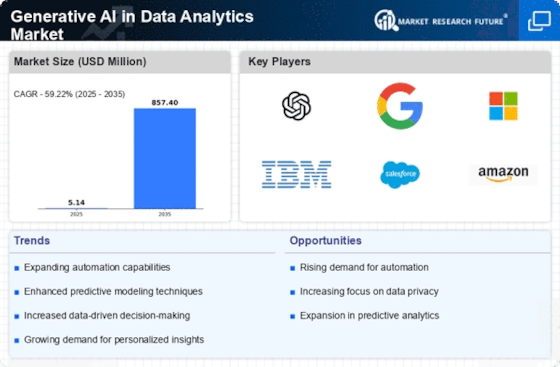Top Industry Leaders in the Generative AI in Data Analytics Market
Competitive Landscape of Generative AI in Data Analytics Market
The data analytics landscape is undergoing a transformative shift, fueled by the emergence of generative AI. This burgeoning technology empowers machines to synthesize novel data, predict future trends, and unlock hidden insights, reshaping how businesses approach decision-making and gain a competitive edge. This report delves into the dynamic competitive landscape of generative AI in the data analytics market, covering key players, market share drivers, emerging trends, and investment hotspots.
Key Players:
-
Google
-
General Electric
-
IBM Corporation
-
Microsoft
-
Opower
-
Eneco
-
Salesforce, Inc
-
Adobe
-
NVIDIA Corporation
-
Hugging Face
Market Share Analysis:
Several factors influence market share in this dynamic space:
-
Technical Prowess: The ability to develop and maintain cutting-edge generative AI models with superior accuracy and performance holds significant weight. Players like OpenAI, with its GPT-3 series, and DeepMind, with its Gopher and Gato models, attract attention with their groundbreaking advancements.
-
Platform Functionality and Ease of Use: Offering user-friendly platforms with intuitive interfaces, pre-trained models, and readily available APIs lowers the barrier to entry for non-technical users. Simplifying access and democratizing generative AI tools fuels widespread adoption.
-
Industry Focus and Vertical Expertise: Catering to specific industry needs with tailored solutions for healthcare, finance, or manufacturing differentiates players. Companies like Arteris (healthcare) and Galileo AI (retail) demonstrate the value of domain-specific expertise in capturing market share.
-
Partnerships and Ecosystem Building: Collaborations with data providers, cloud platforms, and other technology players strengthens offerings and expands reach. Strategic partnerships like Google's with C3.ai for industrial AI applications create value for multiple stakeholders.
New and Emerging Companies:
The generative AI landscape is constantly evolving, with new players emerging rapidly. Some promising examples include:
-
Cohere: This startup excels at factual language models, powering applications like summarizing complex documents and generating research papers.
-
Stability AI: With its DreamStudio platform, Stability AI focuses on generative models for creative arts and entertainment, empowering users to create artistic images and even edit videos.
-
Hugging Face: This company offers a marketplace for open-source AI models, democratizing access and fostering collaboration in the community.
These new entrants demonstrate the breadth and diversity of applications for generative AI in data analytics, further fueling market growth and innovation.
Current Investment Trends:
Venture capital firms are pouring money into generative AI startups, recognizing the immense potential of this technology. Key investment areas include:
-
Foundational Model Development: Companies like OpenAI and Anthropic are attracting significant funding to build and refine large language models, the core engines powering generative AI applications.
-
Industry-Specific Solutions: Startups focusing on vertical-specific solutions in healthcare, finance, and other sectors are gaining traction from investors seeking targeted applications with immediate real-world impact.
-
Explainability and Bias Mitigation: With concerns about fairness and transparency in AI algorithms, companies developing tools to explain generative AI outputs and mitigate potential biases are attracting investor interest.
Latest Company Updates:
- January 27, 2024: Google AI unveils PaLM 2, a 540-billion parameter language model: This new model surpasses the capabilities of its predecessor, demonstrating advances in text generation, translation, and reasoning.
- January 19, 2024: DeepMind releases Gato, a multi-modal AI model: Gato can perform various tasks across different modalities, including vision, language, and robotics, showcasing progress towards general AI.
- January 10, 2024: Hugging Face introduces "Diffusion Bee" for image generation: This new open-source library leverages diffusion models to generate realistic and diverse images, democratizing access to cutting-edge generative AI tools.











